Echo of Cities | Hangzhou, China: Public Bicycle Sharing Leads Green travel
Public bicycles, also known as shared bicycles, act as a public service of renting bicycles at low prices in urban areas. Citizens can ride bicycles for short commutes instead of public transport or private cars so that the problem of “the last kilometer after bus trip” can be solved.
Nowadays, public bicycles are widely popularized to every corner of cities.
But in 2008, Hangzhou began to put the public bicycle sharing system into
operation and won the Guangzhou Award in 2014 with the initiative. The project
promoted public bicycles with great efforts to ease the traffic burden and call
for green travel, emission reduction, and energy conservation, realizing more
economical, environmental, and sustainable urban development.
As shared bicycles are widespread around the nation, Hangzhou Public
Bicycle System also makes more adjustments, exploration, and innovation,
contributing remarkably to the construction of urban ecological civilization.
Today’s Echo of Cities will lead you to see why Hangzhou Public Bicycle System can take
the lead and sustain.
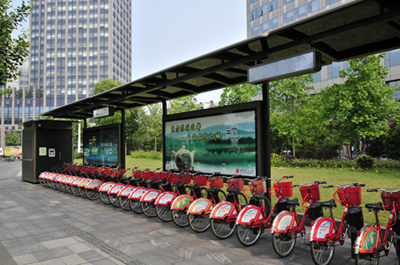
Figure: Hangzhou’s Public Bicycles
About the initiative: Hangzhou’s Public Bicycle Sharing Creates New Mode of Green travel
Before the public bicycle sharing system appeared, traffic congestion was severe in Hangzhou, and “the last kilometer after bus trip” exhausted the citizens. Considering such a local situation, Hangzhou integrated “Public Bicycle Sharing” into the urban traffic service system and initiated the first large-scale bicycle sharing program in China to encourage green travel.
The program proposed a new model of cooperation between the government and
companies. In the “government calls and companies manage” model, the
government invests in the primary system construction, and companies are
responsible for the management expenses. The business models of these companies
include selling advertising space at bicycle stations and providing convenient
public services at service pavilions. At the level of specific operations,
Hangzhou’s public bicycle sharing system built a real-time dynamic scheduling
management mechanism and assign people to help customers rent and return
bicycles during the peak hours in the morning and evening. The program also
opened its own official website, hotline, SMS, and Wechat platform to respond
to the feedback of citizens.
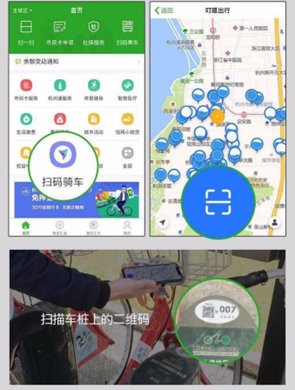
Figure: Scan the OR code on the bike to start a ride
From: zjol.com.cn
When the initiative won the Guangzhou Award, Hangzhou public bicycle sharing system already owned 3,111 service outlets and 78,000 bicycles and served about 300,000 people per day with the free usage rate reaching 96% and satisfaction rate up to 95.09%. If converted by the average distance traveled by riders each day in 2013, the Hangzhou public bicycle system has reduced 137,400 tons of CO2 emissions. That proves the system’s achievements in energy conservation, emission reduction, and the establishment of a low-carbon city. Meanwhile, it’s instrumental in elevating the city image, improving the city layout, and strengthening citizens’ physical health.
Hangzhou’s public bicycle system has emerged in the second Guangzhou Award with its effective low-carbon transport model, setting an example for public transport planning in other cities and becoming a viable initiative to achieve long-term goals of carbon peaking and carbon neutrality worldwide.
Initiative Updates: Ride on the Sustainable Road
During the eight years after the award, Hangzhou’s public bicycle sharing system has also continued to develop, achieving notable success in energy saving and emission reduction. Today, Hangzhou’s public bicycle sharing system has grown to the world’s largest public bicycle sharing project, with a total of 116,000 public bicycles in the city and an average daily rental volume of around 250,000. According to data released by the C40 Cities Climate Leadership Group, from 2008 to 2020, Hangzhou’s public bicycles have been rented out a cumulative total of 1.098 billion times, equivalent to a reduction of 549 million car trips and 1.461 million tons of CO2 emissions.
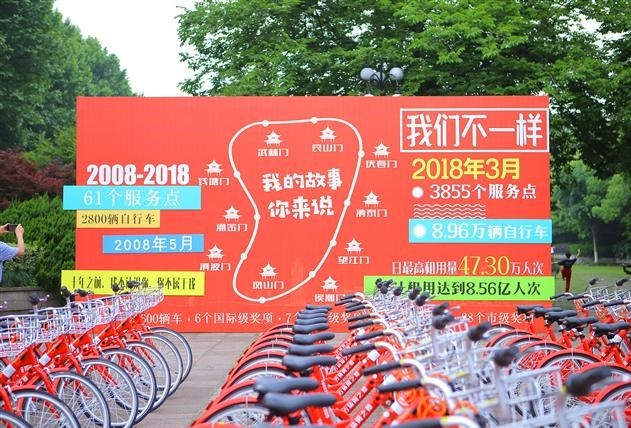
From: The Official Website of Hangzhou Public Bicycle Traffic Service Development Co., Ltd.
Apart from increasing the service area and the number of public bicycles,
Hangzhou took incremental measures in making shared bikes more convenient, such
as scanning the OR code to rent and return bikes and returning bikes overnight.
Different systems in different areas are interconnected one after another to be
combined into an integral part, making it more convenient for citizens to
travel across districts.
Although the rise of private shared bicycles caused some impact on Hangzhou’s public bicycle system, the project has continued to enrich its managing model and add support facilities to achieve sustainable development.
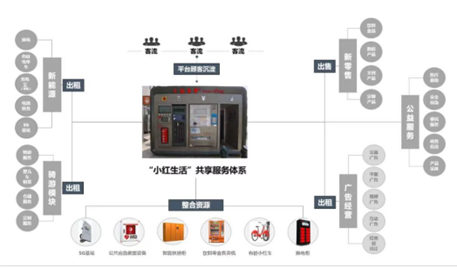
Figure: "Xiaohong Life" Shared Service System
From: Wechat Account of Hangzhou Pubilc Bicycle
Developed Hangzhou public bicycle project has been able to break even by
relying on bicycle service outlets to develop a variety of convenient services,
such as charging, beverage vending, baby stroller rental, and express delivery
storage services. In terms of improving supporting facilities, Hangzhou has
equipped major roads with non-motorized lanes and built cycling greenways with
a total length of about 4,073km. In addition, the project has built modes
combining public transport and bicycle interchange (B+R), and park and ride
(P+R) to enhance the mobility of the public’s trip modes.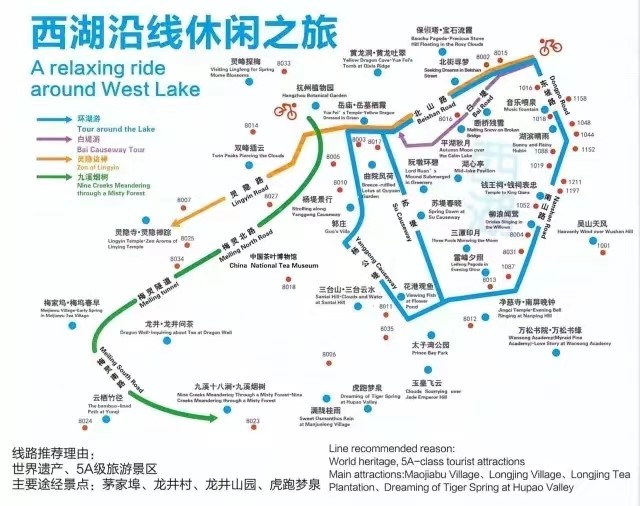
Figure: Riding Routes around West Lake
From: The Wechat Account of Hangzhou Public Bicycle
Furthermore, facing the unexpected COVID-19 in 2020, Hangzhou public bicycle system ensured the enduring operation, disinfection and maintenance, safeguarding the public’s travel needs in face of a significant reduction in public transport and providing travel services for nearly 70 million people in the first 10 months.
Hangzhou Public Bicycle System was selected as one of the five best cycling practical cities in the world by the C40 Cities Climate Leadership Group at the Hangzhou International Day in 2021. Ying Gao, head of Regional Coordination and Partnerships of C40 Cities, said, “This model of Hangzhou, as far as we know, has been spread to more than 300 cities around the world. Hangzhou’s construction in urban wetlands and greenways is also outstanding and is a model worth of promotion and demonstration.
Hangzhou Public Bicycle System has created dramatic environmental benefits, promoted green travel and provided a quiet, economical and pollution-free solution for cities to combat climate change. In the future, Hangzhou public bicycle will become an important new way to travel around the city, creating a new pattern of future life and leading sharing economy and smart city.
Source:
Bikesharing. (2011). Internet Archive.
https://web.archive.org/web/20120719042742/http://uctc.net/access/39/access39
bikesharing.shtml
Author: Ruan Xiuzhen (intern)
Translator: Kuang Yuehuan (intern)
Editor: Li Yuan


 In Focus | World Cities Day: People-Centred Smart Cities
In Focus | World Cities Day: People-Centred Smart Cities City Stories | Fostering community resilience: A lifeline for the Central African Republic
City Stories | Fostering community resilience: A lifeline for the Central African Republic In Focus | Innovative Education, Empowering Futures
In Focus | Innovative Education, Empowering Futures




















 Tel: +86 020 3780 4434
Tel: +86 020 3780 4434 Email: info@guangzhouaward.org
Email: info@guangzhouaward.org Adress: Unit 01-7, 28th Floor, No. 7, Chunrong 3rd Road, Tianhe District, Guangzhou, Guangdong, 510000, PRC
Adress: Unit 01-7, 28th Floor, No. 7, Chunrong 3rd Road, Tianhe District, Guangzhou, Guangdong, 510000, PRC




